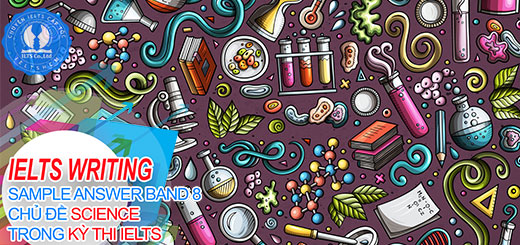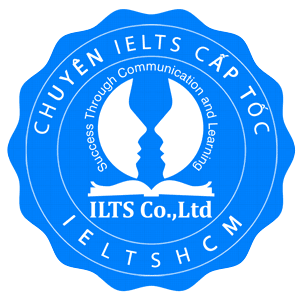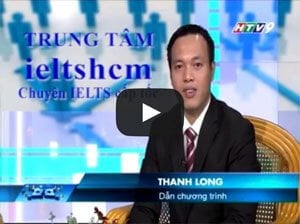Từ vựng và bài mẫu IELTS Writing Task 2 chủ đề khoa học và nghiên cứu science and research
Tìm hiểu bài viết Từ vựng và bài mẫu IELTS Writing Task 2 chủ đề Khoa học và Nghiên cứu Science and Research để chuẩn bị tốt nhất cho kỳ thi IELTS của bạn. Bài viết này cung cấp cho bạn những từ vựng chuyên ngành cần thiết, cùng với các bài mẫu band 9 và câu hỏi thực hành, giúp bạn nắm vững chủ đề và đạt điểm cao trong bài thi IELTS Writing Task 2. Đừng bỏ lỡ cơ hội nâng cao kỹ năng viết của bạn và chinh phục đỉnh cao IELTS với bài viết hấp dẫn này về Khoa học và Nghiên cứu.

Question IELTS Writing Task 2: Some people believe that governments should focus on funding scientific research that directly benefits society, while others argue that pure research, without immediate practical applications, is equally important. Discuss both views and give your own opinion.
The debate over the allocation of resources in scientific research has long been a contentious issue. Some individuals argue that research should only be funded if it directly benefits society, while others believe that pure research is equally important. This essay will discuss both perspectives and argue that a balance between applied and pure research is necessary to drive progress.
Proponents of funding research with direct societal benefits often emphasize the immediate practical applications that can improve people’s lives. For example, biomedical research focused on finding new treatments or cures for prevalent diseases has the potential to save millions of lives and alleviate suffering. Additionally, research on renewable energy sources or sustainable agriculture can contribute to the mitigation of climate change and ensure food security for the growing global population.
On the other hand, supporters of pure research argue that scientific advancements often stem from the pursuit of knowledge for its own sake, without any immediate practical applications in mind. For instance, the development of quantum mechanics and the theory of relativity have led to groundbreaking technological innovations, such as GPS systems and advanced computing, which were not initially anticipated. Moreover, pure research can contribute to our understanding of the universe, human existence, and the fundamental laws of nature, which may have profound implications in the future.
In my opinion, a balanced approach to funding scientific research is necessary to drive progress. While applied research can address immediate societal needs and improve the quality of life, pure research can lead to unexpected discoveries and long-term advancements that we cannot yet foresee. Therefore, governments and research institutions should allocate resources to both types of research to ensure a comprehensive and robust scientific endeavor.
In conclusion, both applied and pure research play critical roles in advancing human knowledge and shaping our society. A balanced approach to funding these different types of research will ensure that we can address pressing societal needs while also pursuing the fundamental understanding that may lead to unforeseen breakthroughs in the future.
Sample Answer band 8 cho IELTS Writing cho kỳ thi IELTS
Question IELTS Writing Task 2: Some people argue that scientific research should focus on solving global issues such as climate change and pandemics, while others believe that it should be directed towards improving people’s daily lives. Discuss both views and give your own opinion.
The allocation of resources in scientific research is a subject of ongoing debate. Some individuals argue that research should prioritize solving global issues like climate change and pandemics, while others advocate for focusing on improving people’s daily lives. This essay will discuss both perspectives and argue that a holistic approach is necessary to address a wide range of challenges.
Supporters of research focusing on global issues emphasize the importance of addressing problems that affect the entire planet. For example, climate change is a pressing issue that has far-reaching consequences, including extreme weather events, rising sea levels, and loss of biodiversity. Similarly, pandemics, such as the COVID-19 outbreak, have highlighted the need for increased investment in public health initiatives and the development of effective treatments and vaccines. Addressing these global challenges through scientific research can have a significant impact on the well-being and survival of humanity.
On the other hand, those who advocate for research aimed at improving daily life argue that technological innovations and infrastructure development can greatly enhance the quality of life for individuals. For instance, advancements in communication technologies, such as smartphones and the internet, have revolutionized the way people interact and access information. Moreover, research on renewable energy sources and sustainable transportation can contribute to environmental sustainability while also providing practical solutions for everyday life.
In my opinion, a holistic approach to scientific research is essential to tackle the wide range of challenges that society faces. By allocating resources to both global issues and daily life improvements, we can ensure that scientific research contributes to a better future for all. This approach will enable us to address urgent worldwide problems while also enhancing the quality of life for individuals on a day-to-day basis.
In conclusion, both global issues and daily life improvements are important areas of focus for scientific research. A holistic approach to resource allocation can help address a broad range of challenges and lead to a more sustainable and prosperous future for humanity.
Vocabulary IELTS about science and research:
- Global issues: Problems that affect the entire world and require collective action. Các vấn đề toàn cầu: Các vấn đề ảnh hưởng đến toàn thế giới và đòi hỏi hành động tập thể.
- Climate change: Long-term changes in the Earth’s climate, primarily caused by human activities. Biến đổi khí hậu: Những thay đổi lâu dài của khí hậu Trái đất, chủ yếu do các hoạt động của con người gây ra.
- Pandemics: Widespread outbreaks of infectious diseases that affect large populations. Đại dịch: Sự bùng phát rộng rãi của các bệnh truyền nhiễm ảnh hưởng đến dân số lớn.
- Technological innovations: New and improved technologies resulting from scientific research. Đổi mới công nghệ: Công nghệ mới và cải tiến do nghiên cứu khoa học.
- Resource allocation: The distribution of resources to various sectors or projects. Phân bổ nguồn lực: Việc phân bổ nguồn lực cho các lĩnh vực hoặc dự án khác nhau.
- Quality of life: The overall well-being and satisfaction experienced by individuals. Chất lượng cuộc sống: Hạnh phúc tổng thể và sự hài lòng mà các cá nhân trải nghiệm.
- Infrastructure development: The construction and improvement of facilities and systems, such as transportation, communication, and utilities. Phát triển cơ sở hạ tầng: Việc xây dựng và cải thiện các cơ sở và hệ thống, chẳng hạn như giao thông vận tải, thông tin liên lạc và các tiện ích.
- Environmental sustainability: The responsible use of resources to protect the environment for future generations. Tính bền vững về môi trường: Việc sử dụng có trách nhiệm các nguồn tài nguyên để bảo vệ môi trường cho các thế hệ tương lai.
- Public health initiatives: Programs and policies aimed at improving the health of a population. Sáng kiến y tế công cộng: Các chương trình và chính sách nhằm cải thiện sức khỏe của người dân.
- Holistic approach: A comprehensive and integrated method that considers all aspects of a situation or problem. Cách tiếp cận toàn diện: Một phương pháp toàn diện và tích hợp xem xét tất cả các khía cạnh của một tình huống hoặc vấn đề.
IELTS WRITING: Writing task 2 Dạng Discuss both views – Sample answer
Question IELTS Writing Task 2: Some people believe that scientific research should be primarily funded by the government, while others argue that private companies should take the lead. Discuss both views and give your own opinion.
The question of whether scientific research should be funded primarily by the government or private companies is a matter of debate. Both public and private sectors have their advantages and disadvantages in terms of research funding. This essay will discuss both perspectives and argue that a collaborative approach between the government and private companies can yield the most significant benefits.
Advocates for government-funded research emphasize the importance of investing in projects that may not be immediately profitable but have significant potential for technological breakthroughs and societal benefits. As the public sector is not profit-driven, it can afford to invest in long-term projects and prioritize research areas that are in the public interest, such as healthcare, renewable energy, and environmental conservation. Additionally, government-funded research can promote equitable access to knowledge and resources, ensuring that the benefits of scientific advancements are shared broadly.
Conversely, proponents of private sector-led research argue that companies have the financial resources and incentives to invest in cutting-edge technologies and drive innovation. Private companies can be more nimble and efficient in allocating resources, as they are often driven by competition and the need to generate profits. This can lead to rapid advancements in fields such as biotechnology, artificial intelligence, and telecommunications. However, one downside of private sector-funded research is that intellectual property rights can sometimes limit the sharing of knowledge and impede further advancements.
In my opinion, a collaborative approach between the government and private companies can yield the most significant benefits for society. Combining the resources and expertise of both sectors can ensure that research is directed towards both public interest and profitable innovation. This partnership can foster a healthy balance between long-term investments in essential research areas and the rapid development of cutting-edge technologies.
In conclusion, both the government and private companies have unique strengths and contributions to make in the realm of scientific research. By adopting a collaborative approach, we can ensure that research funding is directed towards projects that benefit society as a whole while also promoting technological advancements and economic growth.
Vocabulary IELTS about science and research:
- Research funding: Financial support provided for scientific investigations and projects. Tài trợ nghiên cứu: Hỗ trợ tài chính được cung cấp cho các nghiên cứu và dự án khoa học.
- Public sector: The part of the economy that is controlled by the government. Khu vực công: Một phần của nền kinh tế được kiểm soát bởi chính phủ.
- Private sector: The part of the economy that is controlled by private individuals and businesses. Khu vực tư nhân: Một phần của nền kinh tế được kiểm soát bởi các cá nhân và doanh nghiệp tư nhân.
- Technological breakthroughs: Significant advancements in technology or scientific understanding. Đột phá công nghệ: Những tiến bộ đáng kể về công nghệ hoặc hiểu biết khoa học.
- Profit-driven: Motivated by the goal of generating financial gains. Định hướng lợi nhuận: Được thúc đẩy bởi mục tiêu tạo ra lợi nhuận tài chính.
- Intellectual property: Creations of the mind, such as inventions, literary works, and artistic works, that are legally protected. Sở hữu trí tuệ: Những sáng tạo của trí óc, chẳng hạn như phát minh, tác phẩm văn học và tác phẩm nghệ thuật, được pháp luật bảo vệ.
- Long-term investments: Financial commitments made for an extended period. Đầu tư dài hạn: Các cam kết tài chính được thực hiện trong một thời gian dài.
- Collaboration: Working together towards a common goal. Hợp tác: Cùng nhau làm việc hướng tới một mục tiêu chung.
- Equitable access: Fair and unbiased availability of resources, opportunities, or services. Tiếp cận công bằng: Sự sẵn có của các nguồn lực, cơ hội hoặc dịch vụ một cách công bằng và không thiên vị.
- Public interest: The welfare or well-being of the general public. Lợi ích công cộng: Phúc lợi hoặc phúc lợi của công chúng nói chung.



